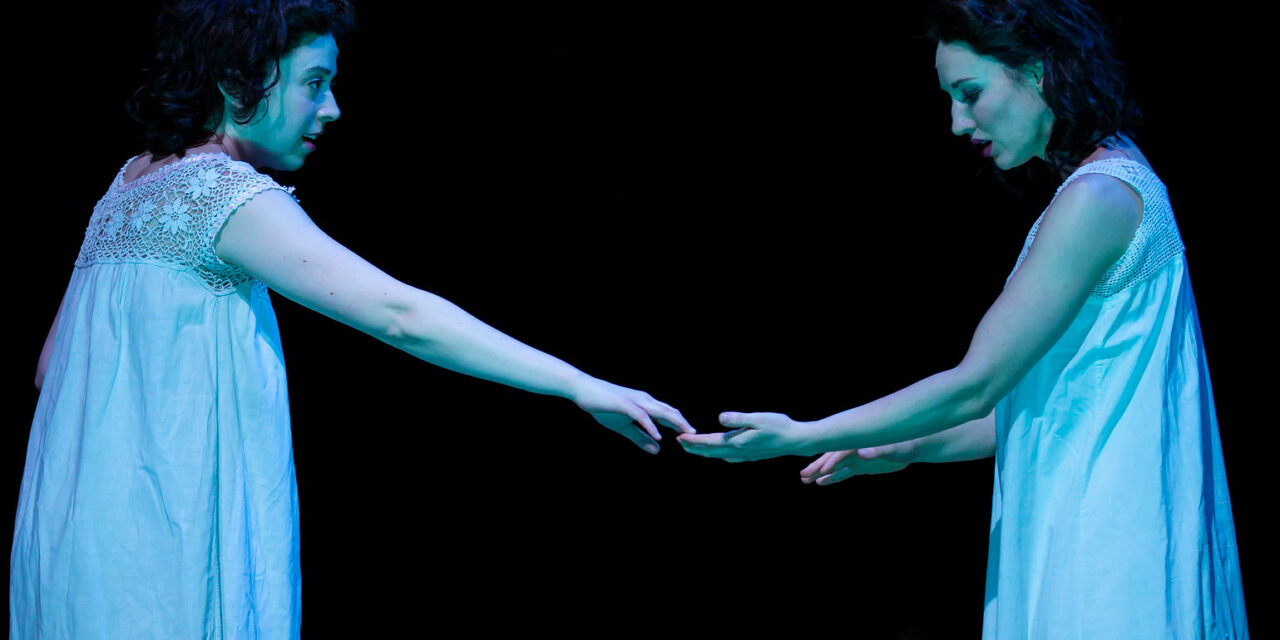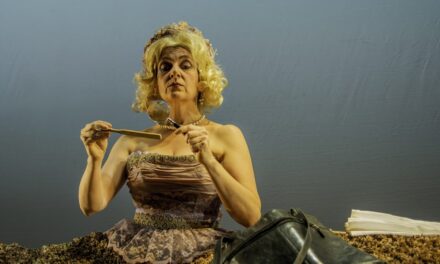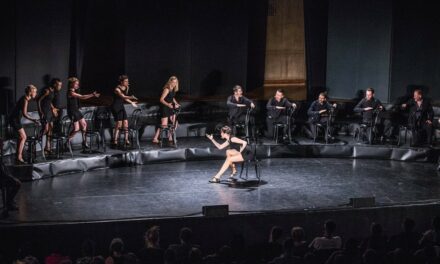Indecent, written by Paula Vogel, was first produced at the Yale repertory theatre in 2015. This present show is directed by Lisa Rubin, artistic and Executive Director of the Segal Centre in Montreal. To be very clear, Indecent is not the staging of Sholem Asch’s play God of Vengeance written in 1906 and that first appeared on Broadway in 1923. This is the story of the difficult journey of a classic work of Yiddish theatre called God of Vengeance (Got fun Nekome), and the process it went through from its creation pre World War I to the present. What Paula Vogel gives us is a play within a play, where 10 excellent actors, dancers and three musicians, all part of the Segal Arts Centre, perform 47 characters including the ones from the original play plus all the people involved in various stagings around the world as the actors grow older as well as the administrative population in Europe and America who influenced positively and negatively the difficult journey of Asch’s play.
Bits of that original work, as well as moments of their collective experiences in theatres across the continent and off stage, are shown by these actors who imitate the style of the performers from Asch’s original Yiddish-speaking theatre company as dancers and musicians. They rehearse, quarrel, defend themselves from attacks by theatre administrators and censors. They show how they survived in Germany and Poland during the war, before they were swallowed by prejudice and anti-Semitism, on the part of the public and the administrators who were afraid to break with traditions and stereotypes.
We learn of every important step that gave life to this troubled production, causing shock, anger and much criticism, especially within the Jewish communities of all the cities it visited. The on-stage illustrations of snippets from the original show, which integrated marvelous dancing and singing, much Klezmer cabaret style and Brechtian snippets of short episodes along with the Klezmer exuberance that exposes and tears open the struggle of a whole Community of Central European Jews. They represented all the actors from the theatre hired to perform what they felt they had the right to show. All they demanded was the right to define themselves as any other cultural community on this earth, despite what tradition might have them believe.
In the original play, God of Vengeance, Yankl and his wife Soreh, run a brothel in their basement. Asch insisted that even Jews are allowed to run brothels and be prostitutes and perform a beautiful lesbian love story that became one of the high points of the show. However with the rise of fascism, especially in America, there was fear that Asch’s theatre was feeding anti-Semitism which became even stronger in the 1930s.
Parallel to this difficulty of dealing with the play that underlies the entire performance, Vogel’s work and Rubin’s staging, embrace the whole context of European Jewish life and Central European theatre unfolding in the background as the company travels around with the show. The authentic traditions of Burlesque and cabaret that reminds us of the Klezmer Cabaret style with a German twist, with cross-dressing, and later as they move towards WWII how this theatre was transplanted to America and the difficulties that awaited those who decided to come to America assuming they would have no trouble fitting into Broadway. However, actors who could barely speak English had a very difficult time and much emphasis was placed on their attempts to prepare for performances in a language they did not know. This side of social and cultural development was emphasized in Vogel’s version and dramatized in a most interesting way as the new Immigrants to America tried their best to read their lines trying to show they were not overcome by language difficulties. Their lack of English prevented them from understanding the administrative interference in the text and the American producers’ need to cut portions of the play to avoid upsetting Americanized Jewish audiences on Broadway who would not want to see Jewish women working as prostitutes, in Jewish run Brothels, or even lesbianism on stage.
Play moves from different historical moments changing actors as the characters age and all the actors adapt to their roles and their ages most strikingly in this perfect ensemble piece where they all fit together like the most perfectly well-oiled machine. As musical theatre is Americanised, we hear how styles, gestures, tunes, and forms that are too strongly linked with Yiddish traditions, are transformed by contemporary American music thus destroying the substance of the original Yiddish roots of the performance.
The show follows the portions of the troop that remain in Nazi-occupied Poland, how the actors tried to continue performing in Lodz Poland; the sets shift to the ghettos. It is all smoothly choreographed with the group that sings and creates touching tableaux of the actors crouching together, as a stone is tossed through a glass window, a yellow star appears sewn on a coat as small props such as these introduce powerful meaning into the space as the sets shift, the actors line up with their suitcases, and shuffle by into the dark smoky mouth of the Auschwitz hell as the American musical theatre blares out Oklahoma, gobbling up the traditional leftovers of what seems to be a new culture rising out of the ashes of a dying culture.
And yet Vogel’s play and the contribution of the Segal Centre are doing much to ensure the return of something beautiful and important of past generations of immigrants, strongly connected to our own families. It was so moving I could barely breathe when it was over.
Anyone who loves the excellent theatre will be thrilled and moved by this performance and by the chance to see the extraordinarily talented work of writers such as Paula Vogel and Sholem Asch translated to the stage.
Indecent continues at the Segal Center for Performing Arts until May 19, 2019. Call the theatre at 1-514-739-7944
This article was originally posted on Capital Critics’ Circle on May 7 and has been reposted with permission.
This post was written by the author in their personal capacity.The opinions expressed in this article are the author’s own and do not reflect the view of The Theatre Times, their staff or collaborators.
This post was written by Alvina Ruprecht.
The views expressed here belong to the author and do not necessarily reflect our views and opinions.


















